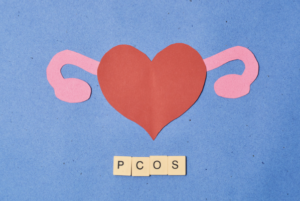I have Endometriosis and often have painful sex?
While shockingly little is known about Endometriosis, many with this condition often report painful sex. So why is this the case, what does this mean, and how can I prevent it?
What is going on?
Endometriosis involves endometrial tissue growing in places other than the uterus lining — such as around your fallopian tubes, ovaries, or at the back of the vagina. For more information on what Endometriosis is, then check out our earlier blog post here.
This additional tissue often become inflamed, particularly around the time of your period due to responding to your hormonal cycle in the same way that the uterus lining does (bleeds and sheds). Therefore, penetration can irritate this inflamed tissue and cause pain. As endometriosis can be in many different places, the extent of this pain and what positions are best for you will vary, which we shall discuss later on.
Those with Endometriosis are also more likely to experience vaginal dryness and a disrupted vaginal microbiome, which often leads to more painful sex. There are multiple theories as to why exactly this is the case including:
- Your whole body works together and when one area is disrupted or inflamed, then this impacts many other bodily functions. Therefore, it is thought that the inflammation caused by Endometriosis (for more info click here), releases inflammatory proteins and hormones into the vaginal microbiome, making it less hospitable to good bacteria and thus more likely for your microbiome to be disrupted.
2. Higher prevalence of bad bacteria
- Women with Endometriosis often have higher levels of bad bacteria in their vaginal microbiome. Although it is not known exactly why this is the case, this causes vaginal dysbiosis.
Sex is also more than just the physical, and often the mental toll of Endometriosis, particularly for those who have not yet received an official diagnosis to explain their symptoms, can be tough. If you feel anxious or worried during sex, this will definitely impact your enjoyment of sex, and of course this is the most important part to address.
How can I reduce the pain?
- Speak to your partner
- When fostering healthy, consensual relationships, it is crucial to speak to your partner about your desires, worries, needs, and just about everything to do with sex. If you are feeling uncomfortable, talking to your partner about this will help them make changes to make your experience more pleasurable. Any partner you have should want to make sex as enjoyable as possible for you, and care for your feelings, pain and concerns. If you do not feel this in your partners, then this may not be a healthy sexual relationship, and we really suggest you speak to them about this, or seek professional help to guide you through your options. But the bottom line is — sex should not just be about one person’s pleasure.
- If you are a bit unsure as how to bring this up to your partner then here are a few tips:
- Designate a time when you are both available, both mentally and physically, to chat about this properly.
- Explain what Endometriosis is — if you don’t want to do this yourself, then sending your partner a few articles explaining what Endometriosis is and what it means is an easy way to do this.
- Explaining how this makes you feel — again, if you don’t feel comfortable speaking about this then writing this down in a note or letter can be a useful way to convey your emotions.
- Discuss these things with your partner, and put together a plan as to how you can make this better for you both. This may involve trying some of the suggestions below.
- Starting conversations are likely to be more productive when you approach the subject in a form of a dialogue rather than as criticism. For example, starting sentences with I really liked it when…”, or How about we try…”. As opposed to starting sentences that centre the problem on your partner such as, You don’t do …. enough”, or You should do …”.
2. Speak to your doctor
- Discuss your symptoms with your doctor, including how this makes you feel. They will be better equipped to help you once they know the full extent of your symptoms and concerns. This will make them better able to recommend different treatment options including appropriate drugs, or laparoscopic surgery to remove additional tissue.
3. Positions
- Depending on where the additional endometrial tissue is, this will impact what positions you may find uncomfortable or comfortable. Try experimenting with a few different ones to see what works for you. In general, positions that entail shallow penetration are best for women with Endometriosis, as this puts less pressure on inflamed areas. These positions include:
- Doggy style
- Raising the hips of the person with Endometriosis — such as by placing a pillow underneath their hips
- Spooning
4. Addressing your vaginal health
- Vaginal health is key to your sexual health and pleasure. Women with Endometriosis tend to have poorer vaginal health and so understanding what is going on in your microbiome and learning how to address it, is a great way to take control of your vaginal health.
- We recommend using one of ScreenMe’s Vaginal Health testing kits. All kits come with a free consultation, so that you can talk through your specific results with an expert, and create a bespoke plan that best fits your needs, concerns and goals.
5. When you have sex
- Additional endometrial tissue is likely to be most inflamed just before or during a woman’s period. Therefore, sex is likely to be less painful in the 2 weeks following a period, when inflammation is lower.
6. Lubricants
- Using lubricants can make penetration a bit easier, particularly for those experiencing vaginal dryness. However, make sure that these are free from fragrances, chemicals and nasty additives. We recommend the Oliovita Intimate Cream!
7. Think about pleasure other than from penetration
- Explore other ways in which you can get intimate that doesn’t involve penetrative sex. Try oral sex, mutual masturbation or other forms of intimacy. Speak to your partner about what you both like, dislike, or wish to try.
Sex is a very personal and sensitive topic, so it is always good to communicate with your partner(s) about what works for you both and what makes you both feel comfortable and enjoy sex. At the end of the day, sex should be something you take pleasure in, and not something that you feel anxious about or dread. If you have any further concerns then we recommend that you speak to a professional, be it your GP, a close friend, a counsellor, or someone else that you trust.
Fariba Khonsari







